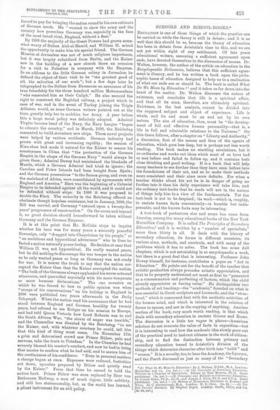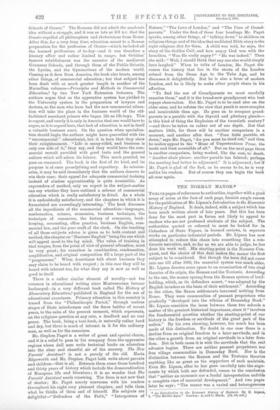SCHOOLS AND SCHOOL-BOOKS.*
EDUCATION is one of those things of which the practice can be carried on while the theory is still in debate ; and it is as
well that this should be so, because the theory of education has been in debate from Aristotle's time to this, and we are not yet within sight of any settlement. Of late years educational writers, assuming a sufficient agreement upon ends, have devoted themselves to the discussion of means. Dr. Welton, however, the author of the article on education in the
Encyclopaedia Brilannica, believes that this sufficient agree-
ment is illusory, and he has written a book upon the philo- sophic bases of education designed to help us to a realization
of what our ends are or should be. The book is called What Do We Mean by Education 11 and it takes us far down into the heart of the matter. Dr. Welton discusses the nature of
existence, and concludes that life is a spiritual affair, and that all its aims, therefore, are ultimately spiritual. Existence, in the last analysis, cannot be divided into the supposed subject and object of experience. Life is whole, and its end must be an end set by its own
nature. The aim of education, then, must be "the develop- ment of full and effective human personality—that is, a life in full and admirable relations to the Universe." On this there follows, after a chapter on "Liberty and Authority," a discussion, first of the means and then of the agents of education, which goes less deep, but is perhaps not less worth reading. The book makes no startling revelations, but it co-ordinates and works out ideas which most of us have had or met before and failed to follow up, and it contains both close thinking and good writing. It is a book that will help many teachers to see further than they have seen before into the foundations of their art, and so to make their methods more consistent and their aims more definite. For when a teacher thinks about his art he is in danger of going no further into it than his daily experience will take him, and the ordinary text-books that he reads will not in the nature of things help him to a view of the fundamentals. Yet the text-book is not to be despised ; its work—which is, roughly, to restate known facts conveniently—is humble but indis- pensable, and the known facts may be interesting.
A text-book of portentous size and scope has come from America, among the many educational books of the New York Macmillan Company. It is called The Principles of Secondary Education,' and it is written by a "number of specialists," more than thirty in all. It deals with the history of secondary education, its forms in different countries, its various aims, methods, and curricula, and with many of the problems which it has to solve. The book has some dull chapters, which is not astonishing in so encyclopaedic a work, but there is a great deal that is interesting. Professor John Dewey himself, for instance, contributes a paper on "Art in Education." He points out for the benefit of the teacher that artistic production always precedes artistic appreciation, and that to be properly understood art must at first be "presented as a consummation and perfecting of factors, which the child already appreciates as having value." He distinguishes two methods of art teaching—the "academia," founded on what is non-essential in Greek sculpture and Leonardo, and the "struc. turd," which is concerned first with the aesthetic activities of the human mind, and which is interested in the relation of forms to spaces, and no in the copying of anything. Another section of the book, very much worth reading, is that which deals with secondary education in ancient Greece and Rome. The discussion is a little too vague in places—American scholars do not overrate the value of facts. in exposition—but it is interesting to read how the academic Idea slowly grew out of the practical need to instruct citizens in the work of citizen- ship, and to find the distinction between primary and secondary education traced to Aristotle's dnitvois,:ohnabiotf,, and
i things which determine character after birth "reason." It is a novelty, too, to hear the Academy, the Lyceum, and the Porch discussed as just so many of the "Secondary
• m What Do We Mean ay Education,' By J. Welton, D.Litt., M.A. London, Macmillan and t>a. [5s. not,—(2) Pso Principles of B000ndami Rdetetwe. Written by a Number of Specialists. Edited by Paul Monroe, Ph.D. same pulalishere. [8s. net.1—(3) Principles ciples an Methods in Commercial Education. By Joseph Rahn, Ph.D., LL.B., and Joseph J. Klein, Ph.D. and C.P.A. Same publishers. Les. net.]—(4) History of Momentary Education in England and Wales. By C. Birch's:mu:thy, Mst.eAv.hoLn London: W. B. oCuliaes.miLteett.4 dEdao—r, a(u54) 9c't:
New Parents' elssisttint.
135.
Od, uetq
Schools of Greece." The Romans did not admit the academic idea without a struggle, and it was as late as 161 B.C. that the Senate expelled all philosophers and rhetoricians from Rome After this, for a very long time, education metint to a Roman preparation for the profession of Orator—which included all the learned professions of to-day—and it was therefore a literary affair and rather limited in range; but Orbilius' famous establishment was the ancestor of the mediaeval Grammar Schools, and through them of the Public Schools, the Lycees, and the Gymnasiums of the modern world. Coming as it does from America, the book also treats, among other things, of commercial education ; but that subject has been dealt with at much greater length in another of the Macmillan volumes—Principles and Methods in Commercial Ednwation,3 by two New York Extension lecturers. The authors argue that as the apprentice system has yielded. to the University system in the preparation of lawyers and doctors, so the men who have had the new commercial educa- tion will take the place in the business world of the old- fashioned merchant princes who began life as lift-boys. This is cogent, and surely it is only in America that one would have to argue, as it is argued here, that lack of education is not in itself a valuable business asset. On the question when specializa- tion should begin the authors might have quarrelled with the " uncommercial" educationist, but it is here that they show their enlightenment. "Life is many-sided, and business is only one side of it," they say, and they would have the coin- • mercial recruit provided with good taste and the general culture which will adorn his leisure. This much granted, we pass on reassured. The book is the first of its kind, and its purpose is at once proselytising and expository. As mission- aries, it may be said immediately that the authors deserve to win their case ; their appeal for adequate commercial training instead of aimless apprenticeship is fatite irresistible. As expounders of method, only an expert in the subject-matter ban say whether they have outlined a scheme of commercial education which is really satisfactory in detail. As a whole it is undoubtedly satisfactory, and the chapters in which it is formulated are exceedingly interesting.' The book discusses all the ingredients of the commereial education—languages, mathematics, science, economics, business technique, the technique of commerce, the history of commerce, book- keeping, accounting, office practice, business English, com- mercial law, and the pure craft of the clerk. On the teaching of all these subjects advice is given as to both content and method, the chapter on "Business English" being the one which will appeal most to the lay mind. The value of training in that tongue, from the point of view of general education, must be very great ; for exercises in combination, condensation, amplification, and original composition fill a large part of the "programme." When Americans talk about business they may claim to be heard with respect ; in this case they will he heard with interest too, for what they say is new as well as good in itself.
There is a rather similar element of novelty—not too common in educational writing since Montessoriem became hackneyed—in a very different book called The History of Elementary Education,' published in England for the use of educational examinees. Primary education in this country is traced from the "Philanthropic Period," through various stages of State interference and the fierce battles of recent years, to the calm of the present moment, which represents, on the religious question at any rate, a deadlock and no real peace. The book, being a text-book, is naturally rather hard and dry, but there is much of interest in it for the ordinary man, as well as for the examinee.
Mr. Stephen Paget is a writer of great and special charm, and it is a relief to pass in his company from the .oppressive regions where dull men write technical books on education into the clear and cheerful air of the nursery. The New Parents' Assistant 5 is not a parody of the old. Maria Edgeworth and Mr. Stephen Paget both write about parents and children—that is all. Between them come those hundred and thirty years of history which include the democratization of European life and literature ; it is no wonder that The Parents' Assistant needs renewing. The form is not now that of stories ; Mr. Paget merely converses with his readers throughout his eight very pleasant chapters, and tells them what he thinks of them and of himself. His subjects are delightful—" Defenders of the Faith," "Interpreters of Nature," "The Love of London," and "The Uses of Grand- parents." Under the first of these four' headings Mr. Paget speaks, among other things, of "talking down" to children on religious things and of the idea that undiluted Bible-story is the right religious diet for them. A child was told, he says, the story of the Golden Calf, and bow angry God was with the Israelites. "Was He really angry P "He was indeed." Then she said : "Well, I should think that any one else would simply have laughed." When he talks of London, Mr. Paget dis- cusses the history that lies in the strata of the London subsoil from the Stone Age to the Tube Age, and he discusses it delightfully. But he is also a lover of modern London, a-nd he is likely to make other people share in his affe'ction.
"To had the use of Grandparents we must carefully examine them," and it is the brand-new grandparent who best repays observation. But Mr. Paget is to be read also on the older ones, and he refutes the view that youth is more complex and incalculable than age. He goes on to compare grand- parents in a parable with the thyroid and pituitary glands— is this kind of thing the Euphuism of the twentieth century ? —and there he takes us rather out of our depth. But that matters little, for there will be another comparison in a moment, and another after that. "Poor little parable, sit down," says Mr. Paget, "for you must be tired out," and then he makes appeal to the "Muse of Unpretentious Prose, the tenth and least accessible of all." But on the next page there is another comparison, being worked, like the rest, to death. "Another chair please : another parable has fainted ; perhaps the meeting had better be adjourned." It is adjourned ; but if Mr. Paget is glad of the fact, as he seems to be, he is very unlike his readers. But of course they can begin the book all over again.















































 Previous page
Previous page